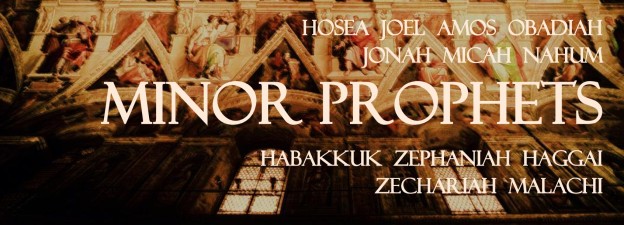"The Lord Might Fulfill His Word" -- 2 Chronicles 9:29-10:15
 Wednesday, March 6, 2019 at 02:31PM
Wednesday, March 6, 2019 at 02:31PM 
An Introduction to the Minor Prophets (3)
There is nothing so tragic and devastating as a civil war–families are divided, there is often extreme cruelty and revenge as those closest to you become your enemies and know your weaknesses. There is often great destruction because your neighbor and former countrymen know what things you treasure the most. But a civil war among the people of God is especially tragic when that people (Israel) have been established as a nation by YHWH, who rescued them from their bondage in Egypt and made a covenant with them at Mount Sinai, before leading them into the promised land, dividing it among the twelve tribes of Jacob. Israel became a great kingdom under David and Solomon with an empire stretching from the Euphrates River in the north to the river of Egypt in the south. YHWH granted them victory over their enemies. But David and Solomon were now dead. The rot of unbelief, resentment, and distrust had been simmering for generations and spread throughout the twelve tribes. This division ate away at national unity to the point there was none. After Solomon died, his son Rehoboam “reigned in his place.” But Rehoboam acted foolishly at the beginning of his reign and was immediately challenged by a rival, Jereboam I, who was exiled to Egypt by Solomon. As set out by Israel’s chronicler in chapters 10-12 of 2 Chronicles, we find a tragic tale of two kings, two kingdoms, and a terrible civil war.
We have begun a series on the Minor Prophets and we are doing some historical background and establishing some context for their varied ministries before we take up each of the prophets individually. The first three prophets we will consider (Amos, Jonah, Hosea) were sent by YHWH to Israel (the Northern Kingdom), which was established by Jeroboam I after most of ten of Israel’s twelve tribes separated from the Southern Kingdom of Judah in a bloody civil war about 930 B.C. In order to understand the ministry of these three prophets to Israel, as well as why YHWH gave them the particular message he did–a warning that the covenant curses were about to come upon Israel, unless his people repent–we need to know something about how and why the united nation of Israel under the rule of a Davidic king was tragically divided into two rival kingdoms.
There are several things we need to know about the course of redemptive history and the role God’s prophets play before we take up the individual books of the Minor Prophets (the Twelve as the Jews know them). First and foremost is that a prophet is called by God and then given YHWH’s words to speak to his people. Moses was the preeminent prophet in Israel’s history. In many ways he is the model for all those prophets who YHWH sends after him–the writing prophets, which include the “Major Prophets” (Isaiah, Jeremiah, Ezekiel, Daniel), and the “Minor Prophets” (Hosea, Joel, Amos, Obadiah, Jonah, Micah, Nahum, Habakkuk, Zephaniah, Haggai, Zechariah, and Malachi). This also includes the non-writing prophets, men who exercise prophetic gifts but who leave no canonical books behind (men like Samuel, Nathan, Elijah, and Elisha). We will encounter several additional non-writing prophets (Ahijah and Shemaiah) who speak God’s words to Israel’s kings.
As we saw from our way-too brief survey of the closing chapters of Deuteronomy (28-34), God established Israel as a nation by making a covenant with them at Mount Sinai–a covenant which was renewed on the plains of Moab before Israel entered the promised land after wandering for forty years in the wilderness of the Sinai desert. YHWH’s covenant with Israel is administered as part of his gracious covenant, but the law (the Ten Commandments) and its pass/fail blessing/curse principle reflect God’s original covenant of works made with Adam in Eden. God promises his blessing upon the condition of “faithful obedience,” but threatens covenant curses whenever his people forsake him, fall into unbelief and sin, and finally turn to other gods–the idols of their pagan neighbors.
To read the rest of this sermon: Click Here


Reader Comments